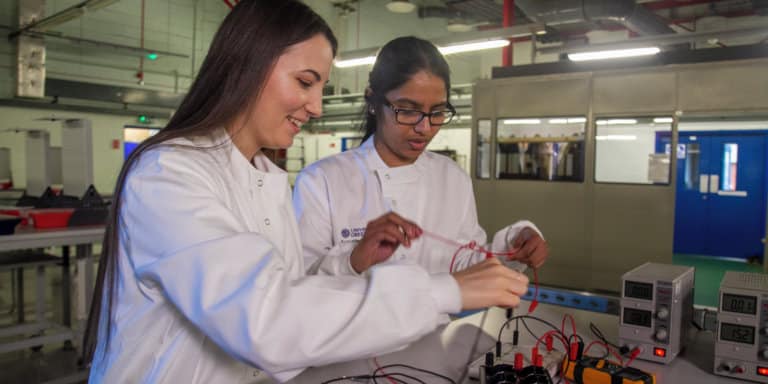
There are various female role models in the STEM field who have paved the way for other girls to step up and be the difference they wish to see. Elizabeth Blackwell, Katherine Johnson and Sally Ride are among the pioneering women who have been an inspiration to others who wish to do the same.
Over the years, the number of women working in Science, Technology, Engineering and Maths in the UK has increased to hit the one million mark in 2019. However, such rosy figures still only translate to 24% of women making up the STEM workforce.
As we progress with the times as a society, educational institutions are also making efforts to encourage girls and women into these fields. If you’re looking for an empowering STEM education that’ll inspire you to be a global changemaker, below are four universities to consider:
University of Greenwich

An education at the University of Greenwich is transformative, innovative and experiential especially for young women looking for a career in STEM. Source: University of Greenwich
The School of Engineering at the University of Greenwich is one of those progressive spaces that empower young women to become STEM leaders. An education here is transformative, innovative and experiential. From field trips to industry experiences with exciting real-world projects (such as analysing sustainable waste management practices in the UK demolition industry), these opportunities prepare students to make an impact during their time here and beyond graduation.
Engineering students here not only benefit from studying in hi-tech laboratories at Medway Campus. They learn from the best, like Dr. Zahra Sangelaji who holds a PhD in control systems engineering and Dr. Marianna Ercolino who has a PhD in Seismic Risk. All professors and lecturers here ensure everyone, regardless of gender, see engineering as an an interesting, diverse, and worthwhile career.
“Not only does the university offer excellent student and wellbeing support, there is also a great system of academic assistance in place,” says Engineering Management, BEng Hons student Florina Hain. “Staff make you feel part of a big community, which is paramount for international students like me who depend on building a new social network.”
A multicultural spirit within all programmes further unites like-minded characters from different backgrounds, from which students could build great teams and friendships.
Engineering programmes offered include chemical engineering, civil engineering, computer engineering and cybernetics, construction, electrical and electronic engineering, engineering, engineering management and engineering technology. Whichever you choose, all engineering degrees start with a common first year, before specialising in your chosen area of engineering.
Follow the University of Greenwich on Twitter for their latest news.
University of Wales Trinity Saint David

Source: University of Wales Trinity Saint David
From undergraduate to postgraduate and part-time courses, University of Wales Trinity Saint David (UWTSD)’s engineering programmes combine both analytical engineering skills and practical hands-on work.
At UWTSD, master’s graduate Nelly Fernandez gained the expertise and skills that she now uses as an application/product support engineer at ETher NDE in St Albans. She works actively in design, as well as serving as liaison with customers to provide pre- and post-sale technical support. She also has duties in probe design, testing, writing reports and engaging with the other partners.
“I was taught by some of the best professors in the field, especially Professor Peter Charlton who was my tutor, and had the experience of working under the supervision of Richard Granville at a company like Oceaneering, which gave me a great understanding of the industry as well provided me with the knowledge and confidence to thrive in it,” says Fernandez.
“Knowing that one’s daily work is helping the world function, as well as improving and maintaining people’s quality of life, is definitely rewarding and motivating. I want to encourage more people, especially women, to delve into the world of Non-Destructive Testing and make an impact.”
For Abbie Summerfield, an engineering lecturer at UWTSD, the Automotive and Motorsport Engineering programme was everything she wanted it to be and more. “Although challenging, if you put the time in, it was achievable,” she says. “Following graduation, I worked for race and rally teams then began teaching on the course I had graduated from.”
University of Dundee

University of Dundee is known for their student experiences and are ranked first among five other Scottish universities by an independent website, StudentCrowds. Source: University of Dundee
Located in Scotland, University of Dundee is ranked #22 out of 140 universities in the UK by StudentCrowds, which is an independent website reviewed solely by students. This also means they are ranked first among five other Scottish universities in the list.
It offers a wide variety of undergraduate and postgraduate engineering programmes. You can find some courses which are accredited by the Joint Board of Moderators (JBM) on behalf of the Engineering Council and meet the benchmark requirements as a Chartered Engineer (CEng) by IMechE.
Courses offered here span four years and are mainly full time. Students here will develop the technical and problem solving skills to address real-life engineering challenges.
Take Farah Alsaqqa, an Industrial Engineering and Management MSc student, for example. “This course contains a great variety of subjects that will improve your understanding of engineering, business, and management principles and how to apply them in the real world,” she says. “The teaching staff are very helpful, welcoming and really supportive.”
Meanwhile, Biomedical Engineering BEng (Hons) students learn from engineers, scientists, and clinicians. They build a solid understanding of how engineering improves patient care while applying engineering principles to solve challenges in the healthcare industry. These lessons, on and off campus, prepare them to develop surgical devices, make improvements to medical instrumentation or discover new techniques in medical imaging in their future careers.
Newcastle University

Being one of 24 universities under the Russell Group, the university is constantly contributing innovative solutions to global challenges through their world-class research. Source: Newcastle University
Newcastle University engineering are a key part of an integrated School of Engineering. They work alongside other engineering disciplines, gaining a breadth of knowledge that enables them to become an engineer of tomorrow. After graduating from the university is placed sixth in the UK (International Student Barometer Autumn 2017), they are set to help address global challenges such as climate change, sustainable energy, transport, clean water supply and waste management.
Programmes that help them get there include Civil Engineering, Electrical and Electronic Engineering, and Mechanical Engineering, to name a few. Each provides students with a real-world focus through collaborations with world-renowned academic researchers and ties with industry and government links.
Expert guest lectures, site visits and field trips, integrated design and industrially focused projects, and employer networking events enhance your learning further. Some of our courses include the chance to study abroad, or spend a year in industry as well.
“It is quite challenging and keeps me busy,” says Ankitha, a Mechanical Engineering: BEng (Hons) student. “It also makes me think quite a lot, since it isn’t easy at all. The labs and practicals keep us motivated, giving us an insight into the actual engineering world.”
Electrical and electronic student Habiba can attest to such hands-on learning experience at Newcastle University: “One of the best things about my programme is the fact that we spend a lot of time in labs. We learn important practical skills as well as putting theory into practice. This is fundamental in building your confidence and experience. You’ll learn to design, build and test circuits as well as programming them.”
Armed with an engineering degree from Newcastle University, these graduates have opened up a world of opportunities for themselves. They have a combination of specialist skills and broad engineering understanding — both of which are critical and sought after in industry, government and consultancies.
*Some of the institutions featured on this article are commercial partners of Study International







